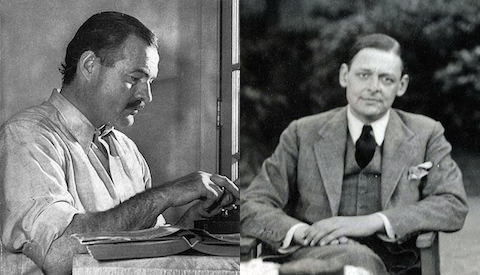
T.S. Eliot may have been the most unavoidable force in American letters in the early 20th century, but he was probably not a very likable person. At least Ernest Hemingway didn’t think so. The burly novelist, often in the habit of telling fellow writers to “kiss my ass,” wrote in a July 1950 letter to writer and editor Harvey Breit that Eliot could do just that “as a man,” since he “never hit a ball out of the infield in his life and he would not have existed for dear old Ezra [Pound], the lovely poet and stupid traitor.” Of Pound’s “stupid” treason, Hemingway had previously written some choice words; Of Eliot’s sins—in addition to his failing to measure up to Yogi Berra, despite both of them hailing from St. Louis—Hemingway included the following: “Royalist, Anglo-Catholic and conservative”
Despite all this, however, Hemingway, like most of his modernist contemporaries, owed a debt to Eliot, whom Papa almost-grudgingly admitted was “a damned good poet and a fair critic,” though “there isn’t any law a man has to go and see [Eliot’s play] the Cocktail party” [sic]. Writes Wendolyn E. Tetlow, author of Hemingway’s In Our Time: Lyrical Dimensions, “despite Hemingway’s acid comments, however, he could not escape Eliot’s influence.” Of particular significance for Hemingway’s terse, elliptical style was the Eliot doctrine of the “objective correlative,” something of a refinement of Pound’s imagism. In Hemingway’s ruminations on his own process, it seems he could not have done without this poetic technique—one of encapsulating abstract concepts and fleeting, insubstantial emotions in the amber of concrete, discrete objects, symbols, and acts.
“Find what gave you the emotion,” Hemingway wrote in “The End of Something,” remarking on a schooner moving through a ruined mill town, “then write it down making it clear so the reader will see it and have the same feeling.” Eliot would never have been so vulgar as to plainly spell out his method in the text itself, like a set of instructions, but Hemingway does so again in Death in the Afternoon:
I was trying to write then and I found the greatest difficulty, aside from knowing truly what you really felt, rather than what you were supposed to feel, and had been taught to feel, was to put down what really happened in action; what the actual things were which produced the emotion that you experienced.
Compare these passages with Eliot’s definition in his 1919 essay on Hamlet: “The only way of expressing emotion in the form of art is by finding an ‘objective correlative’; in other words, a set of objects, a situation, a chain of events which shall be the formula of that particular emotion.” The influence—if not outright borrowing—is unmistakable. Yet Hemingway remained leery of Eliot “as a man.” In 1954, Robert Manning of The Atlantic visited Hemingway in Cuba and found him surly on the subject and “not warm toward T.S. Eliot,” preferring instead to “praise Ezra Pound.” Hemingway would go so far, in fact, as to claim that Pound deserved Eliot’s Nobel.
We shouldn’t take any of this salty talk too seriously. After all, Hemingway, the great boaster, liked to trash people he envied. Even Joe Louis, whom you would think aspiring boxer Hemingway would hold in highest esteem, “never learned to box,” though he was, Papa admitted, “a good getter-upper.”
via Biblioklept
Related Content:
Ernest Hemingway to F. Scott Fitzgerald: “Kiss My Ass”
Josh Jones is a writer and musician based in Durham, NC. Follow him at @jdmagness


You’re certainly right that Hemingway trashed everyone whom he envied or to whom he was indebted. Just ask Gertrude Stein or Sherwood Anderson.
The discovery of the “objective correlative” was not Eliot’s. It was made by Pound in his studies of the Romance poets. In short, he asked why it was that certain poems retained their power in translation. The answer, he found, was in the use of objects that also served as symbols. These were ideas he shared with Hemingway, Eliot, Yeats… everyone.
Hemingway was in fact, a bully, and essentially a real asshole. I am not surprised that he thought little of Eliot, he derided many writers who intimidated him, who he envied. He was fiercely competitive and could be ruthless and dismissive with others in an instant of anger. I tend to think Hemingway was very intimidated by Eliot, and his naysaying of him was just his way of annulling Eliot’s work and validating his own.